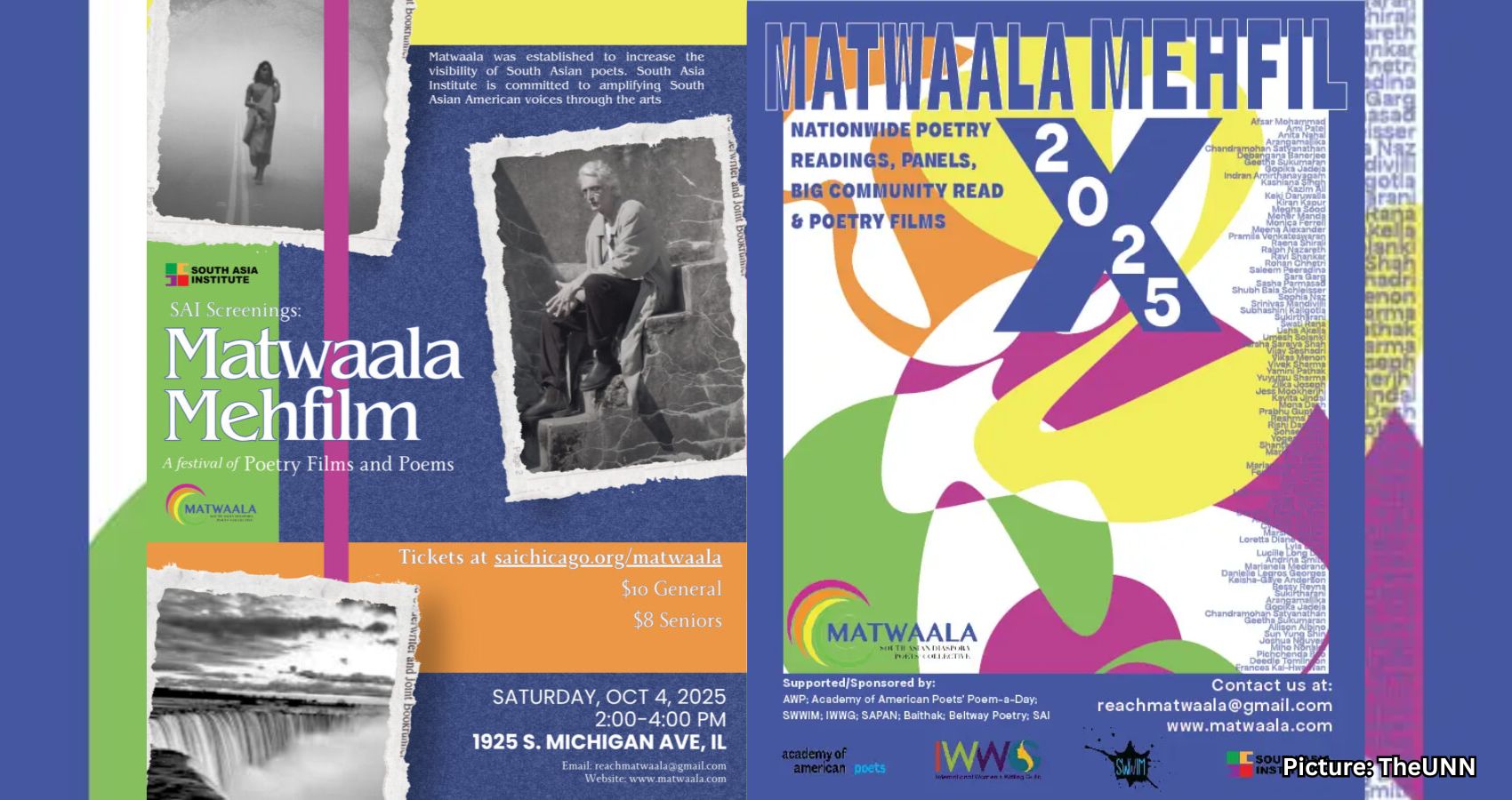Matwaala launched its inaugural South Asian Poetry Film Fest, MATWAALA MEHFILM 2025, on October 4th in Chicago, showcasing the intersection of poetry and visual storytelling.
Matwaala, a South Asian Diaspora Poets’ Collective, celebrated the launch of its inaugural South Asian Poetry Film Festival, MATWAALA MEHFILM 2025, on October 4th at the South Asia Institute in Chicago. This festival aims to amplify the visibility of South Asian poetry while promoting it within the American literary landscape. The event, affectionately branded as MEHFILM, was a significant highlight among the 18 events commemorating Matwaala’s tenth anniversary in 2025.
This festival marked the first occasion where poetry films, also known as film poems, created by South Asian diaspora poets were showcased collectively. Poetry films are short visual interpretations of poems, employing a variety of artistic styles, including photojournalistic, expressionist, illustrative, and animated techniques. Notably, four of the featured films were produced using AI software.
“The collaboration between Matwaala, the South Asian Diaspora Poetry Collective, and the South Asia Institute underscored their shared mission to foster cross-cultural dialogue, artistic exchange, and representation of underrepresented voices in the arts,” said Kashiana Singh, Managing Editor for Poets Reading the News. “The Mehfilm event brought together poets, filmmakers, and audiences for an afternoon filled with 29 poetry films, readings, and reflections, highlighting the transformative power of creative collaboration.”
Festival director Usha Akella noted that Mehfilm was inspired by the Reel Poetry Fest in Houston. “Poetry film represents an osmosis between two genres, transforming the written word into a holistic sensory experience. This reverse ekphrasis, where poems inspire visual media, creates a magical alchemy that allows poetry to be rediscovered in innovative ways,” she explained.
The Matwaala team, including Pramila Venkateswaran, Kashiana Singh, and Usha Akella, curated the films over the course of a year. The festival featured their own poetry films alongside works by other South Asian poets, including pieces from Matwaala’s poets-of-color series, which highlighted the contributions of African American poet Keisha-Gaye Anderson and Palestinian poet Yahya Ashour. SAI’s Haoshu Sascha Deng presented her poetry film based on Kirun Kapur’s poem “From the Afterlife.” Additionally, emerging filmmakers such as Sharanya Banerjee, Anannya Akella, and Anjali Pulim showcased their talents.
Founders Shireen and Afzal Ahmad of the South Asia Institute, the only independent South Asian arts institute in Chicago, expressed that their collaboration with Matwaala exemplified their mission to support innovative platforms and foster cross-disciplinary artistic exchange. They emphasized that Mehfilm merges poetry and visual storytelling to “inspire dialogue, deepen cultural understanding, and celebrate the richness of contemporary South Asian expression.”
Among the standout works, Pramila Venkateswaran’s poetry film “Satyagraha” delves into the resilience of the late John Lewis and the African-American civil rights struggle, drawing inspiration from Gandhi’s principles of non-violence. She stated, “The moving image of film capturing a poetic line is not merely mimesis; it is a creative interpretation that complements the poem, allowing for a unique visual representation.” Venkateswaran further highlighted the festival’s role in establishing filmpoems as a recognized genre while showcasing the diversity of South Asian culture through various themes.
The festival also featured a panel discussion with poets and filmmakers, along with poetry readings from notable figures such as Zilka Joseph, Kirun Kapur, Ignatius Aloysius, Kashiana Singh, Lopamudra Banerjee, Nina Sudhakar, Pramila Venkateswaran, Vivek Sharma, Meena Chopra, Meenakshi Mohan, and Preeti Parikh.
A reception followed the readings, spotlighting young baker Anagha Pashilkar, whose creations delighted attendees. Matwaala recognized SAI founders Shireen and Afzal Ahmad with the Monsoon Maker Award for their vital support of the South Asian literary community, while Usha Akella received the Matwaala Founder Award.
Looking ahead, a selection of poetry films from the festival is scheduled to be screened at the Indo-American Arts Council (IAAC) in New York City and at the Indie Meme Film Festival in Austin next year.
As the festival continues to resonate within the artistic community, it stands as a testament to the power of poetry and film in bridging cultural gaps and fostering understanding among diverse audiences.
Source: Original article

